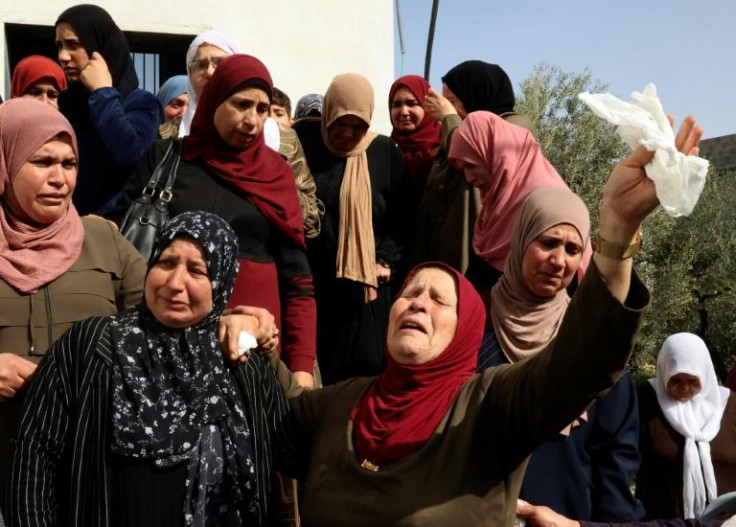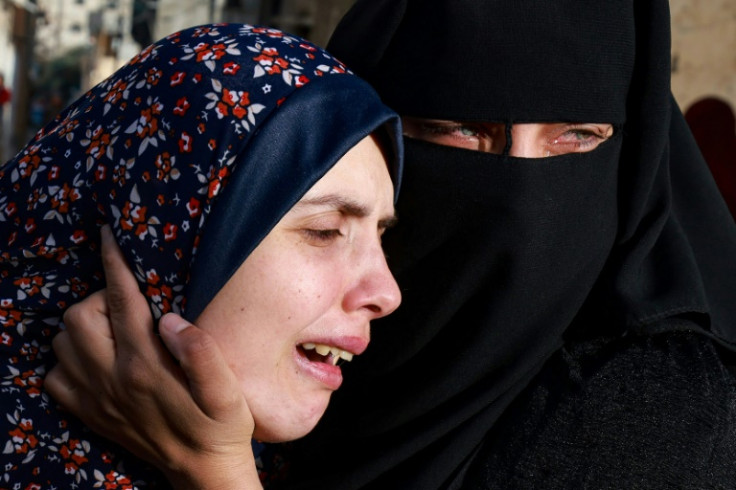Gaza Women Are Sleeping In Their Prayer Robes In Preparation For Israel's Strikes
Women and girls have also been sleeping in their hijabs

As Eid al-Fitr celebrations loom, Palestinian women and girls are relying on their prayer robes to help them face the most catastrophic moments of conflict.
Known as both an "isdal" and "toub salah" amongst Muslims, the prayer cover-up can be a singular piece of material that covers the whole body during prayers, not including the face. An isdal can also be made up of two pieces of material that create a skirt and veil that covers the women and girls past the hips.
Media images taken by journalists reporting from on-the-ground in Gaza have exposed the Palestinian females for relentlessly wearing the prayer cover-up as they flee for their lives, say goodbye to family members and hold their deceased children.
Since October 7, Israel's war on bombardment and siege of the enclave has killed more than 31,000 people, including 13,000 children, according to the Hamas-run Health Ministry in Gaza.
As thousands of women are forced to give birth in inhumane conditions and menstruating women continue to use degrading materials as replacement period products, women are disproportionately facing the brunt of Israel's assault.
UN Women, the arm of the United Nations (UN) that is dedicated to promoting gender equality and empowering women across the globe, has since called the war in Gaza "also a war on women."
"While this war spares no one, UN Women data shows that it kills and injures women in unprecedented ways," the women's arm of the UN said.
According to Eman Shanti, a Palestinian woman from Gaza, the prayer robes are acting as an "official uniform in an emergency" as women are constantly faced with the prospect of being forced to flee their places of refuge at any time of the day or night.

The Palestinian women and girls have also been sleeping in their hijabs.
Dana Al Ghossain, an English teacher and mother of two living in Gaza, explained: "During the war, I wear my hijab to bed, fearing potential strikes that might force us to flee the house suddenly."
"I hold my children close, seeking comfort and attempt to sleep, hoping to escape this painful reality."
While the hijab has acted as a form of constant modest protection for Muslim females throughout the conflict, Al Ghossain added: "Wearing the hijab is a source of pride for me, and I steadfastly embrace it. I've had all my experiences, including the challenges I faced during the war wearing the hijab. It holds great significance for me."
The act of covering also acts as a powerful testament to the resilience and unwavering faith of Palestinian women amid the Ramadan season and catastrophic circumstances.
On Monday this week, three British nationals, an Australian, a Polish national, an American-Canadian dual citizen and a Palestinian were killed while working for the international food charity World Central Kitchen in the Palestinian territory.
The humanitarian organisation has since called for an "independent, third-party investigation" into the killings and announced that it has paused operations in the region "immediately."
As the death toll continues to mount in Gaza, 134 Israeli nationals remain captured by Hamas, according to the Israeli Defence Forces (IDF).
The hostages were abducted as part of Hamas' on-the-ground attack on Israelis, which saw reports of women gang-raped and civilians slaughtered, and have been held by the criminal terrorist organisation for more than 180 days.
© Copyright IBTimes 2025. All rights reserved.






















